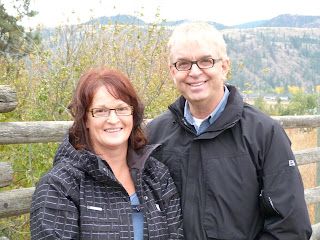Harper’s Trail Estate Winery bills itself as “Kamloops’ First
Winery”.
On occasion, there has been some contention around that
because Doug Wood planted the vineyard for nearby Sagewood Winery in 2005,
three years earlier than Harper’s Trail. However, Sagewood opened in 2014, two
years later than Harper’s Trail, now a much larger producer.
What makes this
vineyard special is same thing that has enabled Lafarge to operate a cement
plant nearby since 1970: the underlying limestone in the area, which is
quarried for cement but also benefits grape growing. Ed Collett, who owns
Harper’s Trail with his wife, Vicki, points to the cliff above the
south-sloping vineyards. “That whole side hill is lime rock,” he says.
This property on the
north side of the Thompson River is about 16 kilometres (10 miles) east of Kamloops.
Formerly, it grew hay and grazed cattle in what is quintessential British
Columbia range country. The winery is named for Thaddeus Harper, the
19th-century American-born rancher who once owned the vast 15,569-hectare
(38,472-acre) Gang Ranch, one of the first farms to use sturdy gang ploughs. Ed
bought his modest slice of ranch country in 2007 after he had conceived the
idea of developing a winery. He developed a taste for wine during travels to
Chile on business for the mining equipment company he established in 1987.
The desire for a
winery emerged during Okanagan wine tours. Ed remembers relaxing at a bed and
breakfast overlooking a vineyard and remarking: “I’ve got to get myself one of
these.” He began planting vines in 2008. He currently has 10.7 hectares (26.5
acres) of vines and has plans for more in stages as he determines what
varieties will succeed. “You have to take baby steps,” Ed notes. “We are
further north [than most vineyards] but obviously, it is not a deterrent for
us.” The cold winters led to the removal of Merlot while a 2008 planting of
Cabernet Franc succeeded so well that more was planted in 2012 and 2018,
followed with 2.4 hectares (six acres) of Pinot Noir and Gamay in 2013.
Riesling, Pinot Gris and Chardonnay also are succeeding. Bacchus may also be
planted.
Wind machines combat early autumn frost. Ginseng shade-cloth on the vineyard’s
borders breaks the valley’s constant winds. Propane cannons deter the birds.
The first several vintages, which included three different
Rieslings, Chardonnay, Pinot Gris, Gewürztraminer, a white blend, a rosé and a
Cabernet Franc, were made for Harper’s Trail at Okanagan Crush Pad in
Summerland. A tasting room opened at the
vineyard in the summer of 2013. The temporary winemaking facility used for that
vintage is being replaced in 2014 by a new winery. There is a picnic patio but plans
for a restaurant remain on hold because, in 2019, the Colletts began
entertaining purchase offers for their successful winery.
Here are notes on the wines.
Harper’s Trail Pioneer Block Riesling 2018 ($18.29
for 429 cases). The wine begins with aromas of lemon, lime and green apple
which are echoed on the palate. The flavours are fresh and zesty, reflecting the
bracing acidity (10 grams) that balances the residual sugar (16.7 grams). The
wine will age very well; in fact, it should be cellared for another year or two
to reveal everything that is going on in the bottle. 91.
Harper’s Trail Silver Mane Block Riesling ($18.29
for 828 cases). The wine begins with aromas of lemon, lime and pineapple. The
palate reveals layers of tropical fruit flavours framed by bright but balanced
acidity (10 grams of acid and almost 20 grams of residual sugar). The mineral
notes of the terroir define the finish. This is an even better candidate for
aging than its mate. 92.
Harper’s Trail Rosé 2018 ($16.99 for
1,020 cases). This is 97% Pinot Gris and 3% Cabernet Franc. The hue is fashionably
pale., The wine has aromas and flavours of strawberry. The finish is crisp and
dry. It is amazing how the splash of Cabernet Franc defines this refreshing wine.
90.
Harper’s Trail Sparkling Chardonnay 2016 ($26 for
240 cases). This is a traditional method sparkling wine. In the glass, there is
a lively display of bubbles. The wine has aromas of citrus and apple mingled
with a delicate note of brioche and almond. Creamy on the palate, the wine has
flavours of citrus. The finish is crisp, dry and refreshingly clean because the
fruit and not the lees flavour is dominant. 91.







No comments:
Post a Comment